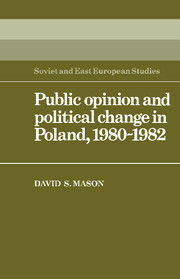Book contents
- Frontmatter
- Contents
- List of tables
- Preface
- Introduction: public opinion and politics
- 1 Public opinion research in Poland
- 2 The public and policy change in the 1970s
- 3 Values of Polish society on the eve of August
- 4 1980: causes and results
- 5 The rise and fall of Solidarity
- 6 The Party and ‘renewal’
- 7 Solidarity and the regime at the end of 1981
- 8 Martial law as a response and the response to martial law
- 9 Conclusions
- Appendix
- References
- Index
3 - Values of Polish society on the eve of August
Published online by Cambridge University Press: 05 February 2012
- Frontmatter
- Contents
- List of tables
- Preface
- Introduction: public opinion and politics
- 1 Public opinion research in Poland
- 2 The public and policy change in the 1970s
- 3 Values of Polish society on the eve of August
- 4 1980: causes and results
- 5 The rise and fall of Solidarity
- 6 The Party and ‘renewal’
- 7 Solidarity and the regime at the end of 1981
- 8 Martial law as a response and the response to martial law
- 9 Conclusions
- Appendix
- References
- Index
Summary
The social and economic changes in postwar Poland had allowed the emergence of a set of values that went beyond material needs. Most of the basic needs of society had been satisfied by the rapid growth in the economy and the standard of living. Just as the satisfaction of basic needs allows the individual to advance to a higher stage of moral development, the satisfaction of basic needs in Polish society had helped develop ‘post-materialist’ values in the population. A March 1980 poll in Poland replicating studies done earlier in Western Europe showed that ‘post-material values’ (such as participation, harmony, and intellectual development) were regarded as more important in Poland than in most of the Western countries (Siemienska 1982). Nevertheless, this orientation was not unanimous by any means: Poles were about equally divided on the materialist/post-materialist scale. For many Poles, the most important national goals remained economic (‘material’) ones. This was to be a source of division in Poland after the formation of Solidarity. Many of Solidarity's supporters believed the primary task of the new union was to secure better economic conditions. For others, particularly the young activists who took the helm of the union, the major goals were non-economic.
Up until the late 1970s, there had existed a ‘social compact’ between the rulers and the ruled in Poland, much like that in the other East European states. Alex Pravda (1981, p. 163) describes this compact as containing three major elements.
- Type
- Chapter
- Information
- Public Opinion and Political Change in Poland, 1980–1982 , pp. 60 - 82Publisher: Cambridge University PressPrint publication year: 1985



